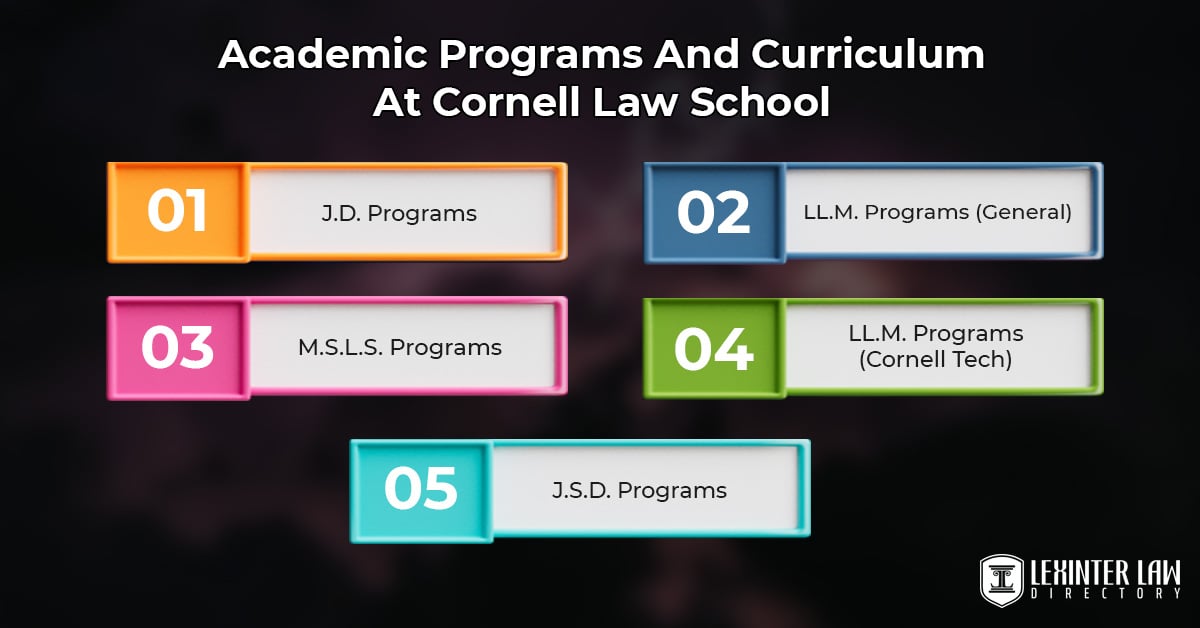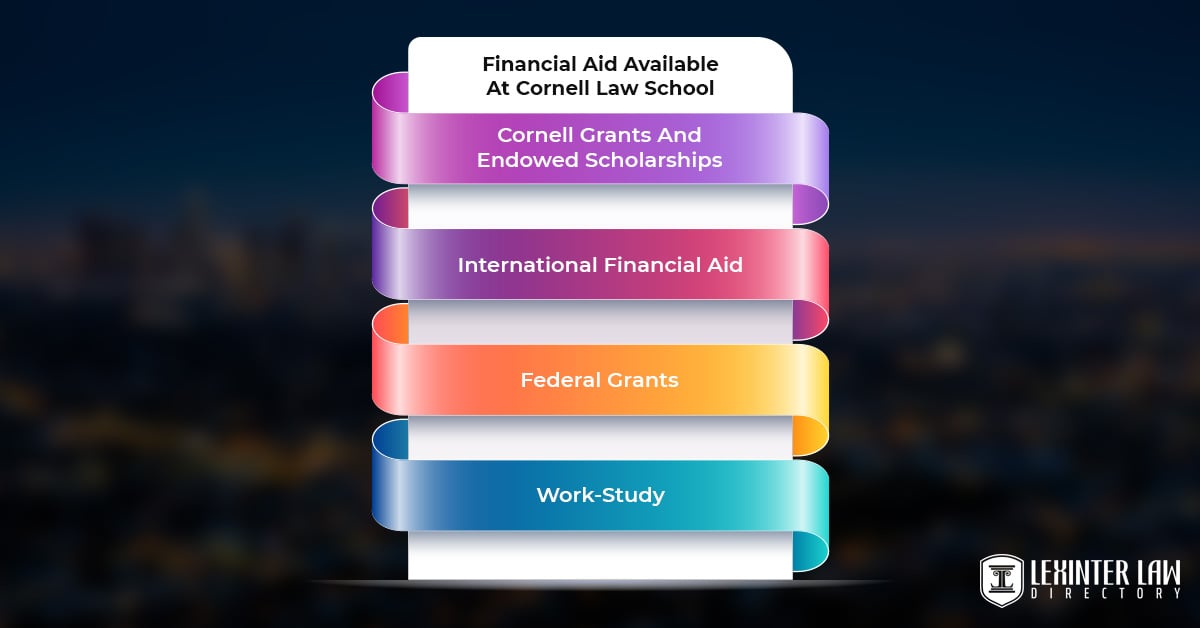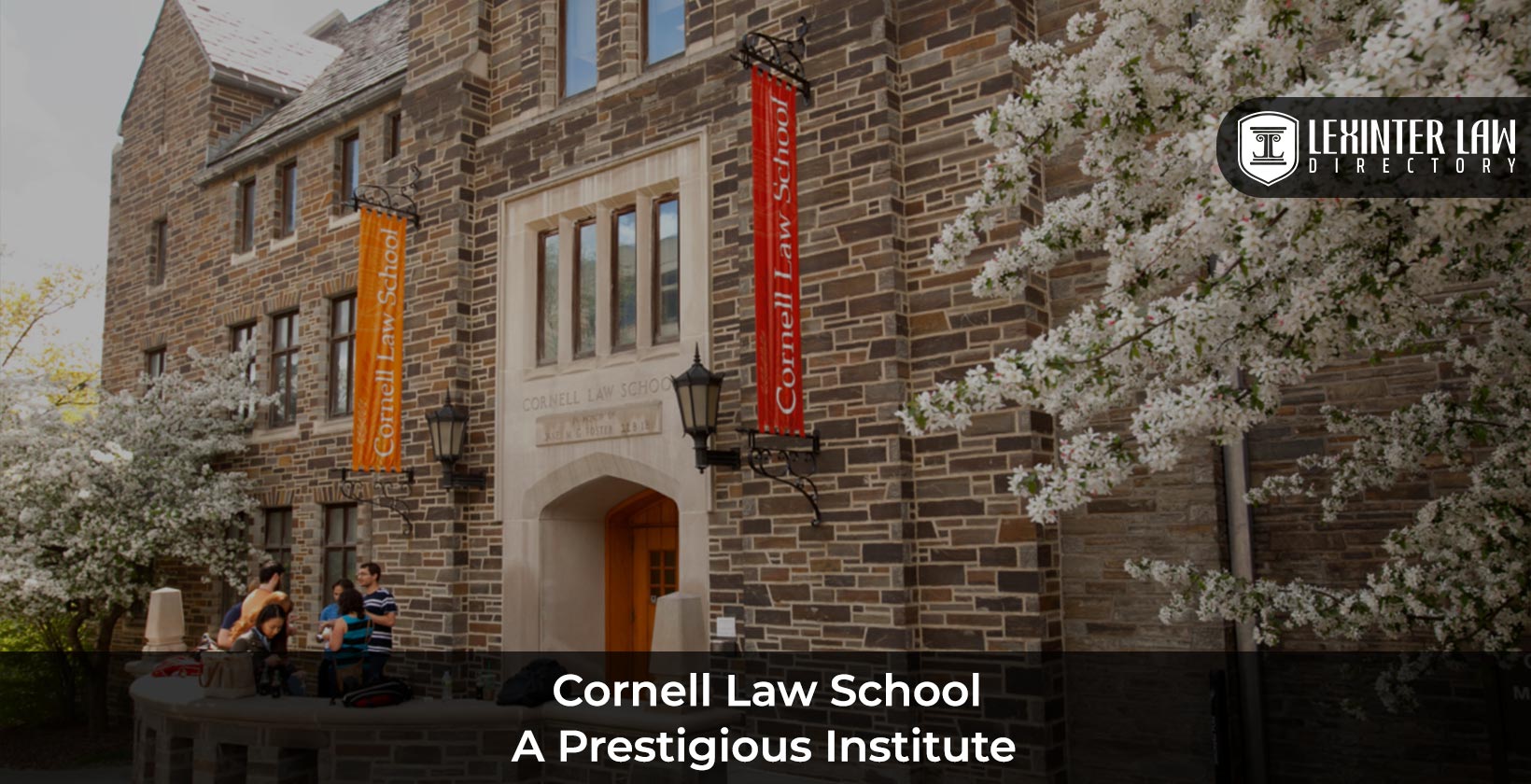Cornell Law School – A Prestigious Institute
Cornell Law School is one of the oldest and most respected law schools in the United States. Founded in 1887 as a department of Cornell University, the school has a long tradition of excellence in legal education and scholarship.
The school’s mission is to prepare students for law practice and the advancement of justice in a diverse and interconnected world. Cornell Law School is also committed to public interest and social justice, offering numerous opportunities for students to engage in pro bono work, clinical programs, and public service careers.
In this article, we will explore Cornell Law School’s acceptance rate, Cornell Law School ranking, location, career prospects, and much more.
Table of Contents
- History And Legacy
- Things To Know About Cornell Law School
- Noteworthy Programs
- Frequently Asked Questions About Cornell Law School
- Conclusion
History And Legacy
Founding Principles
Cornell Law School began a long time ago, in 1887. It started with a big idea: to teach law and ensure justice is fair for everyone. The school wanted its students to learn law in a way that helps people. They believed in hard work, honesty, and treating people right.
Notable Alumni
Cornell Law School has produced many distinguished alumni who have made significant contributions in law, politics, diplomacy, and media. Among them is Tsai Ing-wen, the President of Taiwan since 2016, and Edmund Muskie, a former U.S. Senator from Maine who also served as U.S. Secretary of State. Sol Linowitz, a respected diplomat and business leader, was the U.S. Ambassador to the Organization of American States, while William P. Rogers held positions as both U.S. Attorney General and Secretary of State. Other notable graduates include Mark J. Bennett, Judge of the U.S. Court of Appeals for the Ninth Circuit; Gail Laughlin, a pioneering advocate for women’s rights; Ari Melber, journalist and MSNBC host; and George Washington Fields, the first African American to graduate from Cornell Law, who rose from enslavement to become a successful attorney. These individuals exemplify Cornell Law’s long-standing tradition of leadership, excellence, and service.
Things To Know About Cornell Law School
Cornell Law School Address And Campus
The Cornell Law School address is 55 Myron Taylor Hall, Ithaca, NY 14853. The school’s campus is on a hill overlooking Cayuga Lake, surrounded by natural beauty and scenic views. The campus has three buildings: Myron Taylor Hall, Hughes Hall, and Anabel Taylor Hall. The buildings house classrooms, faculty offices, libraries, moot courtrooms, student organizations, and administrative offices. The campus also features a courtyard, a peace tower, and a bridge over Cascadilla Gorge.
The Cornell Law School’s facilities are modern and well-equipped, providing students access to the latest technology and resources. The Law Library is one of the country’s largest and most comprehensive law libraries, with over 700,000 volumes and online databases. The library also offers study spaces, research assistance, and special collections.
The school’s clinical program operates out of Hughes Hall, where students can work on real cases under the supervision of faculty and attorneys. The school also has partnerships with other legal institutions in the area, such as the Tompkins County Courthouse and the Legal Aid Society of Mid-New York.
Academic Programs And Curriculum

Cornell Law School offers a variety of academic programs for students interested in pursuing a legal career. The school’s flagship program is the Juris Doctor (JD) degree, which can be completed in three years or combined with other degrees or programs.
Among the highly ranked law schools, this school also offers a Master of Laws (LLM) degree for foreign-trained lawyers who want to gain exposure to American law and practice. Additionally, the school offers a Doctor of Science of Law (JSD) degree for scholars who want to conduct original research in a specialized field of law.
The school’s curriculum is designed to provide students with a solid legal theory and practice foundation and an opportunity to explore their interests and passions. The curriculum includes required courses, elective courses, clinics, externships, journals, moot courts, and seminars.
The school’s unique pedagogical approach emphasizes experiential learning, interdisciplinary perspectives, and global awareness. The school’s clinical program is one of the oldest and most renowned in the nation, offering students hands-on experience in various areas of law, such as immigration, labor, criminal defense, mediation, human rights, and entrepreneurship.
The school also partners with other best law institutions for dual degrees or programs, such as Cornell Tech, Paris I Pantheon-Sorbonne University, Humboldt University Berlin, University of Toronto Faculty of Law, and Peking University Law School.
J.D. Programs
The J.D. program offers a solid foundation in law with opportunities for specialization. Students can engage in clinics, externships, and co-curricular activities to develop practical legal skills.
LL.M. Programs (General)
The LL.M. program is designed for foreign-trained lawyers seeking advanced knowledge of U.S. law. Students can tailor their studies in areas such as business law, international law, and human rights.
M.S.L.S. Programs
The M.S.L.S. program is for non-lawyers seeking legal expertise in their field, offering insights into law’s role in business, healthcare, and other industries. The one-year program is flexible and career-focused.
LL.M. Programs (Cornell Tech)
The LL.M. program at Cornell Tech focuses on technology law, addressing issues like intellectual property, privacy, and cybersecurity, ideal for students interested in the intersection of law and technology.
J.S.D. Programs
The J.S.D. program is for those seeking advanced legal research opportunities. Students work with faculty mentors on specialized topics, preparing for careers in academia or research-focused legal roles.
Admissions And Acceptance Rate
| Year | Acceptance Rate | Number of Applications | Number Admitted | Average LSAT Score | Average GPA |
|---|---|---|---|---|---|
| 2025 | 23.10% | 3,722 | 860 | 173 | 3.89 |
| 2024 | 23.11% | 3,722 | 860 | 169 | 3.73 |
| 2023 | 33.80% | 3,414 | 1,154 | 164 | 3.43 |
| 2022 | 40.30% | 3,282 | 1,328 | 162 | 3.42 |
| 2021 | 41.10% | 2,997 | 1,235 | 161 | 3.4 |
| 2020 | 44.20% | 2,713 | 1,206 | 159 | 3.38 |
| 2019 | 48.10% | 2,518 | 1,211 | 158 | 3.37 |
Cornell Law School is highly selective and competitive in its admissions process. As you can see, the acceptance rate at Cornell Law School has been declining over the past six years. This is likely due to several factors, including the increasing number of applications the school receives, the declining number of law school openings, and the growing emphasis on LSAT scores and GPAs.
Cornell University Law School is highly selective, with an acceptance rate of just 23.1%, reflecting its competitive admissions process. Successful applicants typically demonstrate exceptional academic and test performance. The median LSAT score for admitted students is 173, within a strong range of 169 to 175, showcasing high analytical and reasoning skills. Likewise, the median undergraduate GPA stands at 3.89, with most students scoring between 3.73 and 3.96. These impressive figures indicate that Cornell Law attracts and admits students with outstanding academic records and strong potential for success in rigorous legal studies and professional practice.
Rankings And Reputation
| Category | Rating | Category | Rating |
|---|---|---|---|
| Best Law Schools | 18 | Environmental Law | 46 |
| Intellectual Property Law | 26 | ||
| Business/Corporate Law | 16 | International Law | 11 |
| Clinical Training | 31 | Legal Writing | 70 |
| Constitutional Law | 12 | Tax Law | 31 |
| Contracts/Commercial Law | 13 | Trial Advocacy | 112 |
| Criminal Law | 21 | ||
| Dispute Resolution | 48 | ||
Cornell Law School is consistently ranked among the top law schools in the nation and the world. The current Cornell Law School ranking is 18th in the 2025 U.S. News and World Report law school rankings. The school is also ranked highly in various specialty areas, such as business/corporate law, constitutional law, contracts/commercial law, international law, and public interest law.
The school’s reputation is based on its academic excellence, faculty expertise, student achievement, and alumni success. The school is known for its strength in public interest law and social justice, offering students opportunities to pursue careers in government, non-profit organizations, academia, and advocacy.
This prestigious law school has also received recognition for its innovative programs, such as its clinical program, international partnerships, and collaboration with Cornell Tech. The school has also won awards for its diversity and inclusion efforts, such as the American Bar Association’s Alexander Award for Excellence in Pipeline Diversity in 2019. More recently, in 2024, Cornell University was honored with the Higher Education Excellence in Diversity (HEED) Award by INSIGHT Into Diversity magazine, marking the second consecutive year the university received this national recognition for its exceptional commitment to diversity and inclusion.
Career Prospects And Alumni
Graduates of Cornell School of Law enjoy excellent career prospects and are highly sought after by top legal employers. The school’s strong reputation and rigorous academic training open doors to many opportunities in private practice, public interest organizations, government agencies, and the corporate sector.
Job placement rates for Cornell Law School graduates are consistently impressive. Cornell Law School reports a strong employment rate, with 96.6% of its graduates employed within 10 months after graduation, reflecting the school’s strong career support and reputation in the legal field. The school’s extensive alumni network and connections within the legal community provide valuable internship and clerkship opportunities, enabling students to establish meaningful professional relationships and launch their legal careers successfully.
The legacy of Cornell Law School’s notable alumni extends far and wide, shaping the course of law and public policy. Alumni include distinguished judges, government officials, prominent attorneys, and influential legal scholars.
Cornell Law School’s notable alumni embody the school’s commitment to excellence, advocacy, and positively impacting society. Some notable alumni include Robert H. Jackson, a U.S. Supreme Court Justice, and Ruth Bader Ginsburg, the late Associate Justice of the United States Supreme Court, known for advocating gender equality.
You may also be interested to know about Crucial Facts Of Maurice A. Deane School Of Law.
Financial Aid Available At Cornell Law School

Cornell Law School offers a range of financial aid options, including scholarships, grants, work-study, and federal aid, to ensure students have access to affordable legal education. The school strives to meet students’ demonstrated financial need through various support programs.
Cornell Grants And Endowed Scholarships
Cornell offers need-based grants and endowed scholarships to help reduce tuition costs. These awards are designed to assist students with significant financial need, making the cost of attending law school more manageable.
International Financial Aid
Cornell provides some financial aid options for international students, including guidance on external scholarships and eligibility for federal loans, provided students meet specific criteria.
Federal Grants
U.S. citizens and permanent residents can apply for federal grants like the Pell Grant. These need-based grants do not require repayment and are available to eligible Cornell Law students.
Work-Study
The federal work-study program offers part-time jobs to students, providing the opportunity to earn money while gaining valuable legal work experience, either within the law school or with external employers.
Noteworthy Programs
International & Comparative Law
Cornell Law is highly regarded for its focus on global legal studies. The school offers a range of internationally oriented courses, joint and dual-degree programs with universities abroad, and opportunities for study and work experience through international law clinics and exchanges. This focus helps prepare students for careers in international law, diplomacy, and global business.
Experiential Learning & Clinical Programs
Hands-on experience is a key element of Cornell’s legal education. The law school offers more than twenty clinical and practicum programs, along with externships and simulation courses that allow students to apply classroom knowledge in real-world legal settings. The “Lawyering Program” is especially notable for developing essential advocacy, writing, and client skills early in students’ studies.
Interdisciplinary & Dual Degrees
Cornell encourages interdisciplinary learning, allowing law students to pursue joint degrees with other Cornell schools such as Business (MBA), Public Administration (MPA), and Industrial and Labor Relations (MILR). Dual-degree partnerships with international universities also provide students with global perspectives and credentials that enhance career opportunities.
Legal Publishing & Research Centers
Cornell Law hosts several prestigious legal journals, including the Cornell Law Review, Cornell International Law Journal, and Cornell Journal of Law & Public Policy. The school also supports numerous research centers and programs focused on business law, comparative law, law and economics, and women and justice—creating a dynamic environment for scholarly and policy research.
Program In Feminist Jurisprudence & Endowed Chairs
Cornell Law is a pioneer in feminist legal studies, being the first U.S. law school to establish an endowed chair in Feminist Jurisprudence through the Dorothea S. Clarke Professorship. This program underscores Cornell’s commitment to advancing gender equality and promoting diverse perspectives in the study and practice of law.
Frequently Asked Questions About Cornell Law School
1. Is Cornell A Good Law School?
Cornell is an outstanding law school that offers a rigorous and comprehensive legal education. The school is renowned for excellence in teaching, research, and service. The school also has a diverse and supportive community of students, faculty, staff, and alumni.
2. Is Cornell A Top 19 Law School?
Yes, Cornell University School of Law is a top 18 law school. It is consistently ranked among the best law schools in the United States by U.S. News & World Report and other major publications. In the 2025 U.S. News & World Report rankings, Cornell Law School was ranked 18th overall.
3. What LSAT Is Required For Cornell Law?
There is no minimum LSAT score required for admission to Cornell Law School. However, based on recent data, the median LSAT score for the entering class is 173, with the middle 50% of admitted students scoring between 169 and 175. This means that while applicants are not disqualified for scoring below a specific threshold, successful candidates typically achieve very high LSAT scores, reflecting the school’s competitive admissions standards.
4. Is Cornell Law Ivy League?
Yes, Cornell Law School is part of Cornell University, one of the eight members of the Ivy League. The Ivy League is a group of elite private universities in the Northeastern United States that are known for their academic excellence and selectivity.
5. What GPA Do You Need For Cornell Law School?
You will need a strong GPA to be a competitive applicant for Cornell Law School. The median GPA for admitted students in the 2025 entering class was 3.89, which means half of the students had GPAs above this number and half below. Cornell Law also admits students within a GPA range of 3.73 to 3.96, reflecting that most successful applicants have excellent academic records. While there is no strict minimum GPA requirement, maintaining a high GPA greatly strengthens your chances of admission to this highly selective Ivy League law school.
Conclusion
Cornell Law School is a prestigious institute committed to providing exceptional legal education and fostering a passion for public interest and social justice. With its stunning campus, comprehensive academic programs, selective admissions process, and outstanding faculty, the school continues to produce graduates who significantly impact the legal profession and beyond.
As Cornell Law School forges ahead, its dedication to excellence and service ensures its continued reputation as a leading institution in legal education.
Are you interested in the New York School of Law? Read the full blog on An In-Depth Review Of The City University Of New York School Of Law here.

